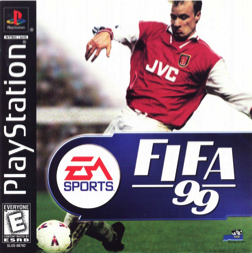
FIFA 99 is a football simulation video game developed by EA Canada and published by Electronic Arts under the EA Sports label. It is the sixth game in the FIFA series and was released in 1998 for Microsoft Windows, PlayStation and Nintendo 64.

Armored Core is a 1997 third-person shooter mecha video game developed by FromSoftware and published by Sony Computer Entertainment for the PlayStation. The game is the first entry in the Armored Core series. A digital port was released in 2007 in Japan and 2015 in North America on the PlayStation Network as a part of the PSone Classics line of games.

Rogue Trip: Vacation 2012, also known as Rogue Trip, is a vehicular combat video game developed by SingleTrac and published by GT Interactive for the PlayStation in 1998. The game is set in an apocalyptic fiction alternative history version of the year 2012 where mercenaries fight against each other using vehicles, and various weapons as they pick up tourists, hitchhikers, and passengers paying them fares for bringing them to vacation destinations around the remnants of the destroyed United States, and these mercenaries call themselves "auto mercenaries".

Aero Fighters Assault is an arcade-style combat flight simulator developed by Paradigm Entertainment and published by Vic Tokai and Video System for the Nintendo 64 in 1997.

Nagano Winter Olympics '98, known in Japan as Hyper Olympics in Nagano, is a multi-event sports game from Konami. It is based on the 1998 Winter Olympics and features 10 Olympic events including skating, skiing, luge, bobsleigh, slalom, curling, halfpipe and snowboarding. The game is part of the Track & Field/Hyper Sports series and would be the last licensed Olympic video game released on a Nintendo home console until Mario & Sonic at the Olympic Games about nine years later.
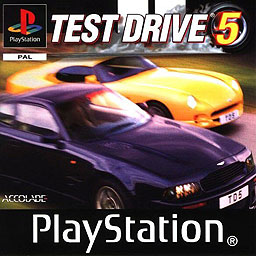
Test Drive 5 is a racing game developed by Pitbull Syndicate and published by Accolade for PlayStation and Microsoft Windows in 1998.

Batman & Robin is an action-adventure video game for the PlayStation based on DC Comics character Batman, and the 1997 film Batman & Robin. It was developed by Probe Entertainment and published by Acclaim Entertainment in conjunction with Warner Bros. Interactive Entertainment and DC Comics. It is a sequel to Batman Forever, which was based on the 1995 film Batman Forever.
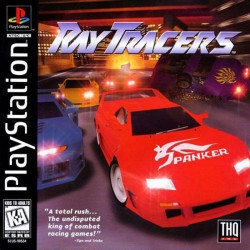
Ray Tracers is an arcade-style auto racing and combat video game developed by Taito and released in Japan and Europe in 1997 and in North America in 1998 for the PlayStation console. It has been compared to Taito's own Chase H.Q. from 1988.
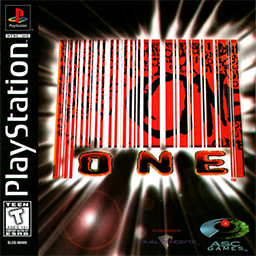
One is a video game released for the Sony PlayStation in 1997. The player controls John Cain, a man who awakes with no memory and one of his arms replaced by a gun, through a series of three-dimensional action stages. One was met with divisive reviews from critics, with some lauding its visuals, level designs, and cinematic feel, while others argued that frustrations with the gameplay ruin what had been a promising game. The game was released as a PSone Classic for download on the PlayStation Network on March 18, 2010.

CrimeWave is a vehicular combat video game, developed and published by Eidos Interactive, released as a Sega Saturn exclusive in 1996–1997.
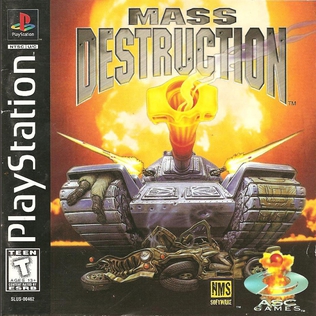
Mass Destruction is a 1997 third-person action game developed by NMS Software and published by ASC Games and BMG Interactive. Released for MS-DOS, the Sega Saturn, and the PlayStation, the game puts players in control of a tank, and tasks them with destroying enemy forces. It has often been likened to Return Fire.
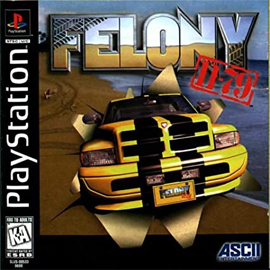
Felony 11-79, known in Japan as Runabout, is a video game developed by Climax and published by Yanoman and ASCII for the PlayStation in 1997. It was part of a late 1990s wave of driving games which encourage the player to create chaos and destruction, being preceded by Die Hard Trilogy and Carmageddon. A sequel to the game, called Super Runabout: San Francisco Edition, was released in 2000.

NBA Fastbreak '98 is a basketball simulator released for the Sony PlayStation in 1997. It takes place during the 1997-98 National Basketball Association season. It was published by Midway Games and GT Interactive. Originally announced under the title "Hardwood Heroes", the game was released with minimal changes as NBA Action 98 on Sega Saturn and Microsoft Windows, published by Sega. Another version was being developed by Z-Axis for the Nintendo 64 under the title "NBA Fast Break 64", with a prospective November 1997 release, but it was cancelled.
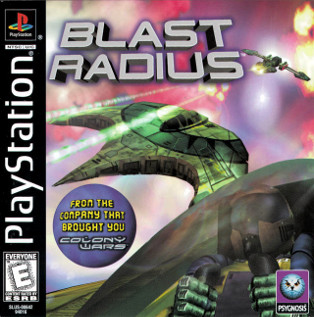
Blast Radius is a space combat simulator video game developed and published by Psygnosis for the PlayStation in 1998-1999.

Buggy is a racing game developed and published by Gremlin Interactive in 1998, and published in North America by Fox Interactive. The game was released in North America as Team Losi RC Racer due to it having a license from RC car manufacturer/racing team Team Losi.

BRAHMA Force: The Assault on Beltlogger 9, known in Japan as Beltlogger 9, and in Europe as BRAHMA Force, is a video game developed by Genki for the PlayStation in 1996-1998. It was announced by Genki as the official successor to their Kileak series.
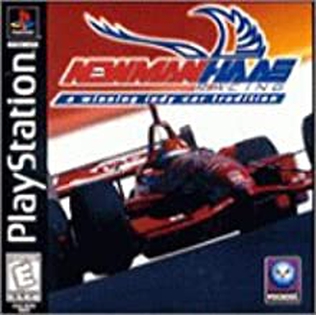
Newman/Haas Racing is a racing video game developed by Studio 33 and published by Psygnosis for the PlayStation and Windows in 1998. It has been described as similar to Psygnosis's Formula One series.

Dynamite Boxing, known as Victory Boxing 2 in Europe and Contender in North America, is a sports video game developed by Victor Interactive Software exclusively for PlayStation in 1998.

R/C Stunt Copter is a video game developed by Shiny Entertainment with Big Grub for PlayStation in 1999.

NHL Powerplay 98 is a sports video game developed by Radical Entertainment and published by Virgin Interactive and Sega for Microsoft Windows, PlayStation, and Sega Saturn in 1997. It is the sequel to NHL Powerplay '96; there was no "'97" entry in the NHL Powerplay series. After Virgin opted not to release the game for the Sega Saturn, Sega acquired the rights and published the Saturn version under the title NHL All-Star Hockey 98 so as to make it a continuation of Sega's own NHL All-Star Hockey series.




















